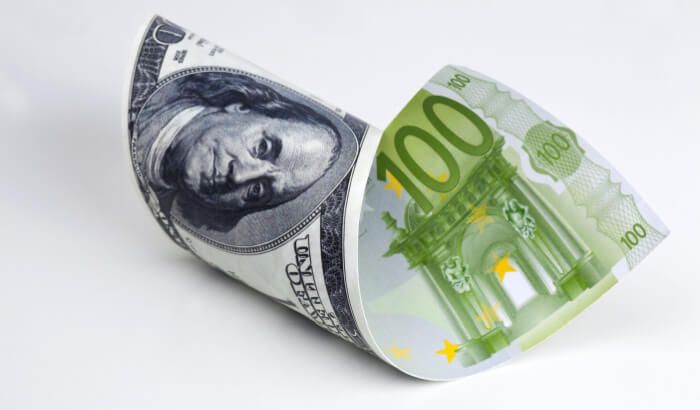
Monday Oct 2 2023 14:19

8 min

The euro (EUR/USD) shed close to 0.5% to trade at $1.0519 on October 2, holding close to its nine-month low of $1.0486 reached on September 27th. Investors were carefully evaluating signals of diminishing inflationary pressures and the looming threat of a recession within the Eurozone, all while taking into account the European Central Bank's (ECB) hawkish stance.
Data from last week revealed that the inflation rate in the Eurozone in September slowed more significantly than anticipated, dropping to 4.3%. This marked the lowest level observed since October 2021, while the core inflation rate also reached a one-year low of 4.5%. Both rates, however, remained well above the ECB's target of 2%. European stocks, such as Frankfurt’s DAX 40 index, traded higher on the news.
In terms of economic indicators, the most recent Manufacturing Purchasing Managers' Index (PMI) readings confirmed that the Eurozone's manufacturing sector continued to experience significant contraction at the close of the third quarter.
ECB vice-president Luis de Guindos, known for his more dovish views, told the Financial Times on Monday that discussions of rate cuts were premature and cautioned against the challenges posed by navigating the "last mile of disinflation."
“We are on our way towards 2 per cent,” said de Guindos. “That’s clear. But we must monitor that very closely, as the last mile will not be easy... the elements that might torpedo the disinflation process are powerful,” he said.
According to the FT, most economists think the eurozone economy is likely to shrink in Q3 2023, contributing to an easing of price pressures and making the ECB unlikely to raise rates further.
De Guindos’ remarks, however, show that the central bank is intent on keeping interest rates “higher for longer.”
Calculate your hypothetical required margin for a Forex position, if you had opened it now..
Category

Instrument


Bid
Ask
Account Type
Direction
Quantity
Amount must be equal or higher than
Amount should be less than
Amount should be a multiple of the minimum lots increment
USD
EUR
GBP
CAD
AUD
CHF
ZAR
MXN
JPY
Leverage
Required Margin
Required Margin
Current conversion price:
Past performance is not a reliable indicator of future results.
Sharply weaker Eurozone inflation and the scaling back of ECB rate hike expectations have made the euro vulnerable to further weakness in the near term, said economists at MUFG:
“The weakening growth outlook for China has been one factor that has weighed on the Euro over the summer alongside weak growth in Europe and the paring back of ECB rate hike expectations.
The release of the latest CPI reports at the end of last week revealed that headline and core inflation both fell sharply to 4.3% and 4.5% respectively in September. The weaker inflation data will reinforce expectations for no further hikes from the ECB and cast doubt on whether the September hike was necessary with the Eurozone economy currently so weak as well. It leaves the Euro vulnerable to further weakness in the near-term.”
In a quote shared by FXStreet, Ulrich Leuchtmann, Head of FX and Commodity Research at Commerzbank, said that the real cost of quantitative easing and regulation were much higher than usually assumed. According to the economist, euro undervaluation is a significant negative factor for Europe’s currency bloc:
“Permanent EUR undervaluation means that we Europeans are getting poorer on a permanent basis. Sometimes that can become quite obvious, for example when American employees working remotely and pensioners buy up the property market in Spanish holiday resorts. However, even disregarding such obvious effects EUR undervaluation means: we give away our export goods at cheap prices and pay over the odds for our imports.
I am not sure whether this factor was sufficiently considered in the cost-benefit analysis of those who were responsible for QE and regulation.”
Economists at UBS saw the euro to dollar pair trading at $1.06 in December 2023, potentially going on to rise to $1.12 by September next year provided Europe stays of recession and the Chinese economy stabilizes:
“Until the year-end, we now expect the U.S. dollar to trade sideways against most currencies.
We now forecast EUR/USD, USD/CHF, and GBP/USD to trade at 1.06 (previously 1.12), 0.92 (0.87), and 1.20 (1.29), respectively, by end-December. And in Asia-Pacific, we see USD/JPY and AUD/USD trading at 145 (previously 142) and 0.65 (0.66), respectively, by end-December.
But looking further ahead, relative growth dynamics are likely to run against the U.S. dollar in 1H24. The US economy has yet to bottom, while Europe and China already have.
We expect U.S. dollar strength to peak next year and the greenback to give up some gains. We reflect this in EUR/USD, USD/CHF, and GBP/USD with our September 2024 forecasts at 1.12 (previously 1.16), 0.87 (0.84), and 1.30 (1.36), respectively. This view requires Europe to stay out of recession and China to stabilize.”
Chris Turner, Global Head of Markets at Dutch bank ING, wrote that the euro to dollar rate may test the 1.05 mark at some point this week on pressure from the greenback:
“Last week's late bounce in EUR/USD looks to have petered out above 1.06 and further points to quarter-end flows briefly weighing on the dollar. The aforementioned revisions to US consumption and savings data make the case for EUR/USD to stay lower for a little longer, meaning that the 1.0490/1.0500 area could easily be retested this week.
Expect the calendar to confirm another set of soft PMIs for Europe in September and focus to switch to whether the European Central Bank (ECB) needs to deliver one final rate hike after all. There are plenty of ECB speakers this week, and the highlight will probably be President Christine Lagarde speaking at a monetary policy conference on Wednesday. For reference, money markets have virtually priced out any further ECB tightening in this cycle – just 3-4bp of tightening priced around the turn of the year.
Elsewhere, we mentioned last week that Italian fiscal concerns could start to have an impact on the euro. Let's see whether the weekend announcement by the Italian government that it plans to sell EUR21 billion of assets 2024-26 has any impact on the pressured government bond market.
In his euro forecast, Scotiabank’s Chief Currency Strategist Shaun Osborne agreed with Turner on the currency’s potential support levels:
“Developing EUR gains through the latter part of last week stalled Friday and the soft close on the week effectively drew a line under the minor EUR recovery.
The trend remains the market’s friend for now and weak trend momentum – while signaling the EUR is potentially oversold here – remains a dead weight on the EUR’s attempts to recover.
Support is 1.0490/1.0500. Resistance is 1.0600/1.0610.”
EUR/USD traded at $1.0519 at the time of writing, down 0.51% on the day.
When considering foreign currency (forex) for trading and price predictions, remember that trading CFDs involves a significant degree of risk and could result in capital loss.
Past performance is not indicative of any future results. This information is provided for informative purposes only and should not be construed to be investment advice.
Asset List
View Full ListLatest
View all
Thursday, 20 February 2025

8 min

Thursday, 20 February 2025

5 min

Thursday, 20 February 2025

2 min



